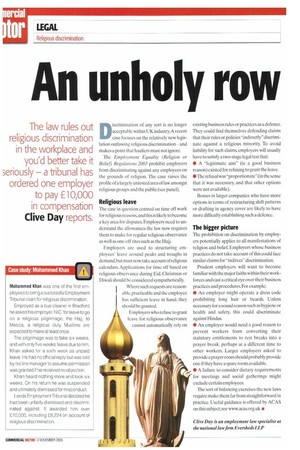An unhol y row
Page 42

If you've noticed an error in this article please click here to report it so we can fix it.
The law rules out religious discrimination in the workplace and you'd better take it seriously — a tribunal has ordered one employer
to pay E 1 0,000
in compensation Clive Day reports.
Discrimination of any sort is no longer acceptable within UK industry.A recent case focuses on the relatively new legislation outlawing religious discrimination—and makes a point that hauliers must not ignore.
The Employment Equality (Religion or Belief) Regulations 2003 prohibit employers from discriminating against any employees on the grounds of religion. The case raises the profile of a largely untested area of law amongst religious groups and the public (see panel).
Religious leave
The case in question centred on time off work for religious reasons,and this is likely to become a key area for disputes. Employers need to understand the allowances the law now requires them to make for regular religious observance as well as one-off rites such as the Hajj.
Employers are used to structuring employees' leave around peaks and troughs in demand, but must now take account of religious calendars. Applications for time off based on religious observance during Eid, Christmas or Diwali should be considered sympathetically.
Where such requests are reasonable, practicable and the employee has sufficient leave in hand, they should be granted.
Employers who refuse to grant leave for religious observance cannot automatically rely on existing business rules or practices as a defence. They could find themselves defending claims that their rules or policies "indirectly" discriminate against a religious minority. To avoid liability for such claims, employers will usually have to satisfy a two-stage legal test that: • A "legitimate aim" (ie a good business reason) existed for refusing to grant the leave.
• The refusal was"proportion ate" (in the sense that it was necessary, and that other options were not available).
Bosses in larger companies who have more options in terms of restructuring shift patterns or drafting in agency cover are likely to have more difficulty establishing such a defence.
The bigger picture
The prohibition on discrimination by employers potentially applies to all manifestations of religion and belief. Employers whose business practices do not take account of this could face similar claims for "indirect" discrimination.
Prudent employers will want to become familiar with the major faiths within their workforces and cast a critical eye over their business practices and procedures. For example: • An employer might operate a dress code prohibiting long hair or beards. Unless necessary for a sound reason such as hygiene or health and safety, this could discriminate against Hindus.
• An employer would need a good reason to prevent workers from converting their statutory entitlements to rest breaks into a prayer break, perhaps at a different time to other workers. Larger employers asked to provide a prayer room should probably provide one if they have a spare room available.
• A failure to consider dietary requirements for meetings and social gatherings might exclude certain employees.
The sort of balancing exercises the new laws require make them far from straightforward in practice. Useful guidance is offered by ACAS on this subject; see www.acas.org.uk •










































































































































































































